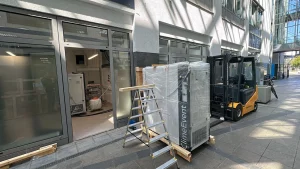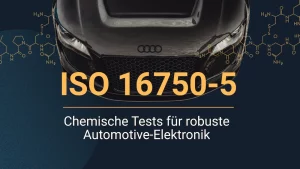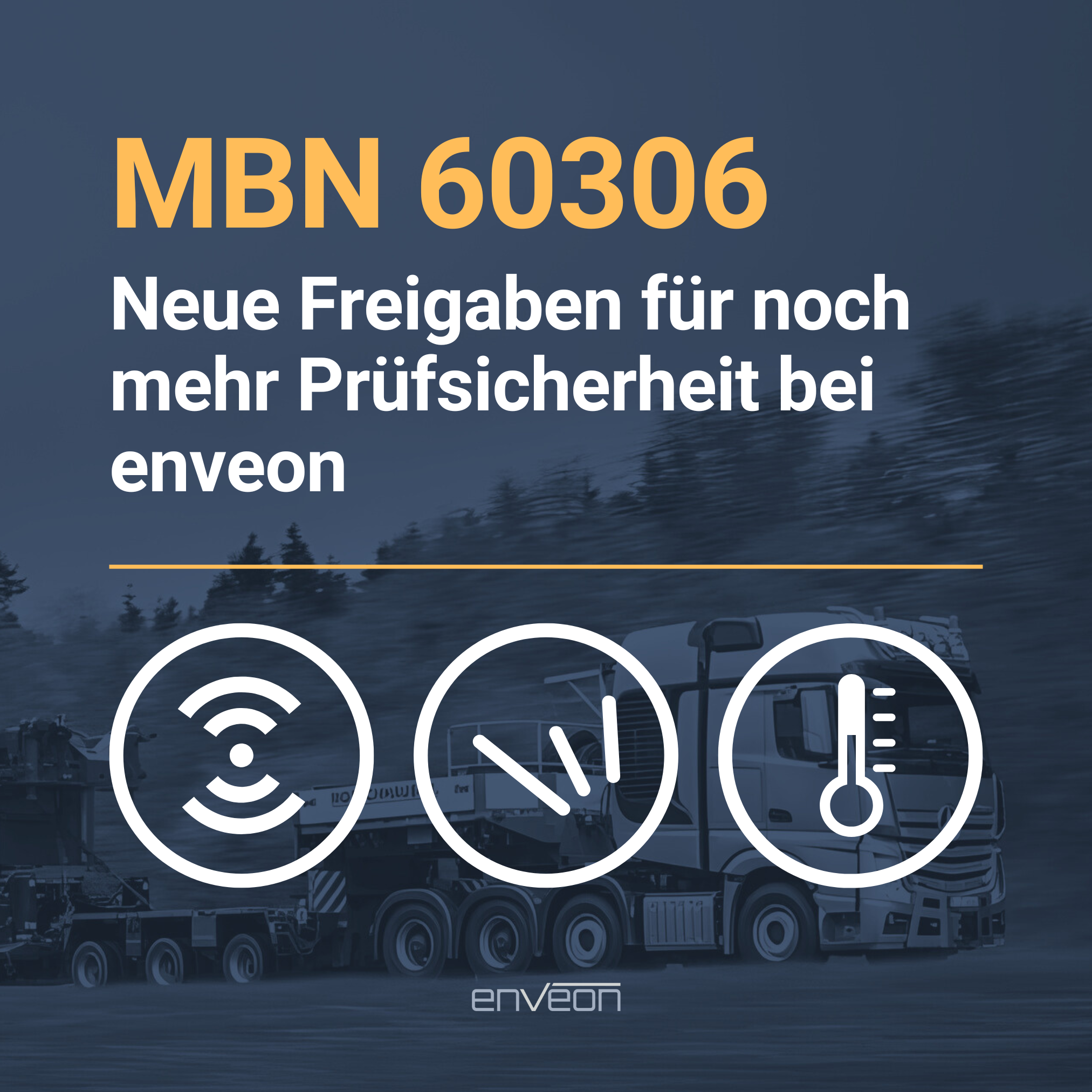New Approvals for Even Greater Testing Reliability at enveon
The commercial vehicle industry has evolved rapidly in recent years. Modern trucks and work vehicles are no longer mere “workhorses,” but highly complex machines that must deliver top performance both on the road and off-road. Electrical, electronic, and mechatronic components play a central role: from engine controls and sensors for exhaust treatment to components in infotainment or brake systems. Commercial vehicles, in particular, are often exposed to extreme stresses: strong vibrations on unpaved roads, high temperature fluctuations between day and night, moisture from rain and slush, or even salt fog during winter operation.
In this context, the MBN 60306:2023-08 is gaining significant importance. It defines how components in commercial vehicles must be properly tested and validated so they can function reliably even in the harshest environments. The test procedures described form a kind of “stress test package,” specifically designed to simulate typical stresses encountered in real-world operations. These include shocks from potholes or curbs, vibrations on cobblestone roads, and extreme temperature changes—for example, when an engine is started in a cold environment. The standard thus plays a key role in the quality assurance of electrical and electronic components and is a high priority for many commercial vehicle manufacturers and suppliers.
At enveon, we have been closely following these developments from the beginning. We are an accredited test laboratory specializing consistently in environmental simulation testing. With the new MBN 60306:2023-08, we aim to help our customers test their products in compliance with standards and prepare them for tough real-world conditions. In this blog post, you’ll learn which areas of the standard we specifically cover—from mechanical tests (M-04, M-05, M-06) and various climate tests (K-01 to K-16) to service life examinations (L-02, L-03). We’ll also show you how we at enveon ensure, with cutting-edge test equipment and highly qualified teams, that your components not only meet the standard requirements but also prove themselves in the real world.
Let’s take a closer look together at which testing focuses are especially relevant in the MBN 60306:2023-08—and why you can rely on enveon for precisely these tests.
Mechanical Tests (M-Series)
M-04 Vibration Testing
Vibration testing (M-04) is essential to ensure a component withstands continuous loads from shaking and vibrations in commercial vehicles. At enveon, we test your components using state-of-the-art shaker systems that realistically replicate all typical and extreme load scenarios. This helps identify weak points early—before they become field failures.
M-05 Mechanical Shock
Shock testing (M-05) simulates impact loads—for example, from potholes, curbs, or accidents. Your control units or sensors must function reliably under such conditions as well. Through targeted high-speed tests, we identify potential material and design flaws.
M-06 Mechanical Repeated Shock
Mechanical repeated shock (M-06) involves repeated impacts, such as those that occur when doors or flaps are opened and closed frequently. Especially in commercial vehicles, intensive door movements or constant vibrations are common. This test ensures your components withstand daily “open and close” operations without damage.
Climatic Tests (K-Series)
K-01 High/Low Temperature Storage
A component must withstand extreme temperatures not only during operation but also during storage in a commercial vehicle. That’s what K-01 tests. At enveon, we examine whether your components continue to function smoothly after hours of exposure to freezing cold or extreme heat.
K-02 Step Temperature Test
K-02 tests the functionality of your components across various temperature stages. This highlights potential temperature weaknesses—such as during heating up or cooling down. You can be sure your product performs correctly across the entire required temperature range.
K-03 Low-Temperature Operation
In winter, a commercial vehicle doesn’t stay in the garage—it must be ready for use, even at sub-zero temperatures. K-03 focuses on the operability of your components at extremely low temperatures over extended periods, ensuring control modules and sensors remain functional in frosty conditions.
K-04 Repainting Temperature
Repainting or repair of parts is common in commercial vehicles. K-04 checks whether your components can withstand short-term high temperatures like those in paint ovens. This helps prevent damage from process heat.
K-05 Temperature Shock (Component)
Temperature shock (K-05) is particularly tricky: going from very hot to very cold (or vice versa) within seconds—such as when a hot engine block is suddenly cooled by a puddle. Our thermal shock tests uncover such extreme stress and show whether your product is robustly designed.
K-08 Humid Heat, Cyclic
High humidity and temperature changes accelerate aging and can lead to corrosion or material fatigue. K-08 simulates cyclic moisture and heat conditions. You’ll detect early whether condensation forms and causes damage.
K-09 Humid Heat, Cyclic (with Frost)
One level tougher than K-08: this combines moisture and cold, running your components through frost scenarios. K-09 ensures that alternating cold, moisture, and reheating doesn’t damage your products.
K-14 Humid Heat Constant
Sometimes, persistent high humidity alone can push a product to its limits. K-14 simulates a constant warm, moist climate over an extended period, revealing corrosion and aging that may occur in continuous operation.
K-15 Condensation and Climate Test
The condensation test (K-15) targets the formation of dew inside electronics—for example, in the morning when temperatures rise quickly, or at night when they drop significantly. Many failures result from condensation penetrating housings. K-15 greatly reduces the risk of short circuits and corrosion.
K-16 Temperature Shock (Without Housing)
Electronic assemblies are often installed without additional housing. K-16 tests whether circuit boards, PCBs, and individual components can withstand rapid temperature changes—without the buffer of a housing. This helps detect early whether solder joints or plastics respond defectively.
Service Life Tests (L-Series)
L-02 High-Temperature Endurance Test
Your component must not only resist high temperatures briefly—it should withstand them for days or even weeks. L-02 subjects components to sustained high temperatures to reveal aging and thermal fatigue.
L-03 Temperature Cycle Endurance Test
Technical products are rarely exposed to a single fixed temperature. L-03 simulates a continuous switch between hot and cold—just like in varied everyday or extreme environments. If your product survives this endurance run, you can confidently promise customers a long lifespan.
Your Advantage with enveon
- Comprehensive Norm Expertise: We specialize in the MBN 60306:2023-08 and offer precisely the testing methods most important to you.
- State-of-the-Art Lab Equipment: Multiple climate chambers, shakers, and test setups enable realistic simulation of diverse operational conditions.
- Holistic Service: From technical clarification and test planning to final documentation—you get everything from a single source at enveon.
- Accelerated Market Readiness: With validated, robust components, you avoid costly recalls and bring your products to market faster and more safely.
Conclusion:
Requirements in the commercial vehicle sector are steadily increasing—just like testing demands. With the MBN 60306:2023-08, you can be sure that your components will successfully handle all mechanical and climatic stresses. And with enveon, you’ll have a reliable partner to professionally and efficiently perform exactly these tests.
Do you want to learn more or request a specific test? Contact us—and together we’ll ensure your components meet the high demands of the commercial vehicle industry with ease.



